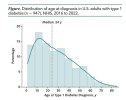Angela64
Well-Known Member
- Messages
- 308
- Location
- Berkshire
- Type of diabetes
- Type 2
- Treatment type
- Tablets (oral)
- Dislikes
- T2 and PAF & now Haemochromatosis!
Hi,Yes, if you're a suspected T1 (LADA), seeing an endo and having at least a C-peptide test is a very good idea.
Should it turn out to be T1, insulin is the only treatment. For what it's worth, for me, starting insulin (when I was still diagnosed as a T2) was such a relief, I finally had a way to manage my BG instead of just being frustrated with numbers that wouldn't come down.
Excuse my ignorance, I'm not from the UK. But your profile says you're in the UK, why can't you get a referral to an endo on the NHS?
Has your nurse talked about the possible risks of DKA on flozins if you turn out to be a T1?
She said a T1 1/2 , a LADA, Im not remembering what the letters stand for. NHS ha ha, sadly I’d be waiting for months and months. She is very knowledgable and we get on really well, I feel that she feels very self confident she can see the patterns. I wore a CGM the last couple of weeks which was very useful, she had all the charts in front of her and yes I could see that my issues are at lunchtime mainly. She has suggested insulin to bring down the GL to help levels.
‘DKA’ & flozins - T1, is that only T1 as she says more like a T1 1/2? She said that I’d be unlikely to have a Hypo, which has been a concern in the past when my number was lower than 6 before going to bed.
So, had spoken to hubs about tests, I know of an expert consultant endo, I saw her when I was recently diagnosed and had gone ‘Low Carb’, she was very very pleased with how I had got my HbA1C so much lower in a short time. SO, thinking of seeing her if possible but it will be self funded as my insurance won’t cover it.
So at the moment I have a foreign holiday in a few weeks, so when I get back I need to make another appointment with her to discuss what I do next. She has ordered me another CGM, so hubs suggested I asked about the tests as really I should include her in this even if I may have a long wait for NHS tests. I won’t wait, fed up big time with everything. I also have had lot of other health challenges causing me stress.
Last edited:


